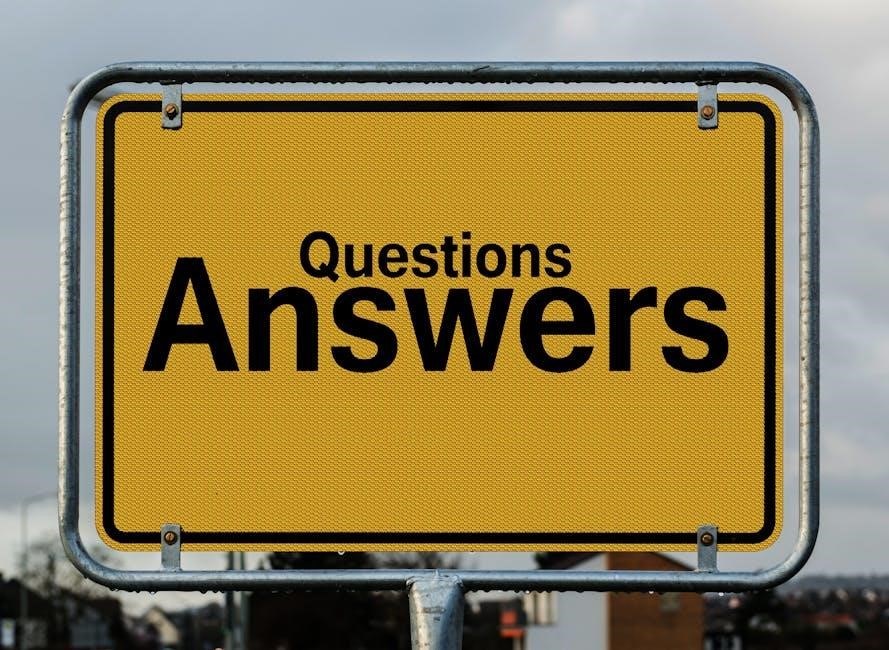The Security Guard Exam Questions and Answers PDF is a comprehensive resource for aspiring guards, offering multiple-choice, true/false, and scenario-based questions to aid thorough preparation and understanding.
1.1 Overview of the Security Guard Exam
The security guard exam assesses knowledge and skills essential for the role, covering topics like security procedures, legal issues, and emergency response. It features multiple-choice, true/false, and scenario-based questions, designed to evaluate practical understanding. Candidates must demonstrate proficiency in handling real-life situations, adhering to regulations, and providing effective security services. The exam is a critical step toward obtaining a security guard license, ensuring individuals are prepared to perform their duties responsibly and efficiently.
1.2 Importance of Using PDF Resources for Preparation
Using PDF resources for security guard exam preparation offers unmatched flexibility and convenience. These documents provide comprehensive coverage of exam topics, including legal issues, emergency procedures, and security protocols. PDFs allow self-paced study, enabling candidates to review material anytime and anywhere. They also offer a clear understanding of question formats, such as multiple-choice and scenario-based queries, helping candidates familiarize themselves with the exam structure. This ensures better retention and readiness for the actual test, making PDFs an indispensable tool for successful preparation;

Types of Questions in the Security Guard Exam
The exam includes multiple-choice, true/false, and scenario-based questions, designed to assess knowledge, critical thinking, and practical application of security protocols and emergency procedures effectively.

2.1 Multiple Choice Questions
Multiple choice questions are a key component of the security guard exam, offering several answer options to test candidates’ knowledge. These questions cover a wide range of topics, including security procedures, legal regulations, and emergency response. Designed to assess both factual recall and critical thinking, they require careful analysis to select the correct answer. The format ensures a standardized evaluation, making it easier to compare candidate performance. Regular practice with these questions helps build confidence and improves exam readiness.
2.2 True or False Questions
True or False questions are straightforward, requiring candidates to determine the correctness of a statement. These questions assess factual knowledge and understanding of key concepts, such as legal regulations, emergency procedures, and security protocols. They are often used to evaluate a candidate’s ability to distinguish between accurate and inaccurate information. Covering topics like patrol duties, legal authority, and first aid, True or False questions provide clear answers, making them easy to score and effective for assessing foundational knowledge.

2.3 Scenario-Based Questions
Scenario-Based Questions present real-life situations, testing practical application of knowledge. They simulate on-the-job challenges, such as handling incidents, responding to emergencies, or interacting with the public. These questions require candidates to demonstrate critical thinking and decision-making skills. For example, scenarios might involve de-escalating conflicts or securing a breach. They help assess a candidate’s ability to apply training and protocols effectively, ensuring they are prepared for actual security roles. These questions are essential for evaluating problem-solving abilities in high-pressure situations.

Key Topics Covered in the Exam
The Security Guard Exam covers essential topics such as general knowledge, legal issues, and emergency procedures, ensuring comprehensive preparation for real-world scenarios in the security field.
3.1 General Knowledge and Security Procedures
General knowledge and security procedures form the foundation of the exam, covering essential duties like patrols, access control, and emergency communication. Candidates are tested on their understanding of basic security protocols, such as monitoring premises, handling unauthorized access, and maintaining order. Questions also address knowledge of standard operating procedures, including report writing and incident documentation. This section ensures candidates possess the practical skills and awareness needed for effective security operations, preparing them to respond appropriately in various scenarios while adhering to established guidelines.
3.2 Legal Issues and Regulations
Legal issues and regulations are critical components of the exam, focusing on laws governing security practices, use of force, and privacy rights. Questions address knowledge of specific acts, such as the Private Investigators and Security Guards Act, and responsibilities under local and federal laws. Candidates are tested on understanding legal boundaries, arrest procedures, and implications of unlawful actions. This section ensures guards operate within legal frameworks, maintaining professionalism and accountability while performing their duties. Proper understanding of these regulations is essential for ethical and lawful security operations.
3.3 Emergency Procedures and First Aid
Emergency procedures and first aid are vital skills for security guards, ensuring they can respond effectively during crises. Questions cover fire safety, evacuation protocols, and first aid techniques for injuries. Candidates must understand proper responses to medical emergencies, such as CPR and wound management. The section also includes scenarios involving natural disasters or violent incidents, testing the ability to prioritize safety and provide immediate care. Mastery of these procedures is essential for protecting lives and maintaining order in critical situations.

Benefits of Practicing with PDF Resources
Practicing with PDF resources offers flexibility, allowing candidates to study anytime, anywhere. These materials provide comprehensive coverage of exam topics, ensuring well-rounded preparation and improved knowledge retention.
4.1 Flexibility and Convenience
PDF resources for security guard exam preparation offer unparalleled flexibility and convenience. Candidates can access study materials anytime, anywhere, without internet dependency. This format allows self-paced learning, catering to diverse schedules and preferences. Additionally, PDFs can be easily downloaded and viewed on various devices, making them ideal for on-the-go studying. The convenience extends to quick navigation and search features, enabling focused review of specific topics. This adaptability ensures candidates can maximize their study time efficiently, regardless of their location or availability, making PDF resources an indispensable tool for modern learners.
4.2 Comprehensive Coverage of Exam Topics
The PDF resources provide a detailed study guide, covering essential topics such as security procedures, legal regulations, and emergency response. They include multiple-choice, true/false, and scenario-based questions, ensuring a well-rounded understanding of the exam material. The comprehensive approach guarantees that candidates are thoroughly prepared for all aspects of the exam, with clear explanations and cross-references to aid in understanding and retention. This ensures that learners can confidently tackle various question formats and subject areas, making the PDF a vital tool for successful exam preparation.

Sample Questions and Answers

The PDF includes sample questions and answers, covering topics like security duties, legal knowledge, and emergency responses. It provides multiple-choice, true/false, and scenario-based queries to test understanding and readiness for the exam.
5.1 Basic Security Guard Duties
Sample questions focus on fundamental responsibilities, such as patrolling, monitoring access points, and responding to emergencies. For instance, “What is the primary duty of a security guard during a fire alarm?” The answer highlights ensuring evacuation and securing the area. Another question asks, “What should a guard do upon encountering a trespasser?” The response emphasizes contacting authorities and detaining the individual until help arrives. These questions ensure a strong understanding of core security practices and protocols.
5.2 Legal and Regulatory Knowledge
Questions in this section focus on legal requirements and regulations governing security guards. For example, “What legal authority does a security guard have to detain someone?” The answer explains the difference between citizen’s arrest and police detention. Another question asks, “What are the implications of the Private Investigators and Security Guards Act?” The response outlines licensing requirements and legal responsibilities. These questions ensure understanding of the legal framework essential for ethical and lawful security practices, preparing candidates to operate within legal boundaries effectively.
5.3 Emergency Response Scenarios
Questions in this category simulate real-life emergency situations, testing the ability to respond appropriately. For example, “What steps should a security guard take during a fire?” The answer outlines evacuation procedures and alarm activation. Another question asks, “How should a guard handle a medical emergency?” The response emphasizes calling 911 and providing first aid. These scenarios ensure preparedness for critical incidents, helping guards make quick, informed decisions to protect people and property effectively.

Tips for Effective Exam Preparation
Understand the question formats to improve accuracy. Practice time management to ensure all questions are answered. Regularly review and focus on weak areas for better retention and confidence.
6.1 Time Management Strategies
Effective time management is crucial for success in the security guard exam. Allocate a specific time for each question to avoid spending too long on one. Start by skimming through the entire exam to identify easier questions, answering them first to secure initial points. For complex questions, use the process of elimination to narrow down options. Avoid getting stuck on a single question; move forward and return later if time permits. This strategy ensures efficient use of the exam duration, maximizing the number of attempted questions and improving overall performance.
6.2 Understanding Question Formats
Understanding the formats of security guard exam questions is essential for effective preparation. The exam includes multiple-choice questions, true/false statements, and scenario-based queries. Multiple-choice questions require selecting the correct answer from several options, while true/false questions test factual knowledge. Scenario-based questions present real-life situations, assessing problem-solving skills. Familiarizing yourself with these formats helps reduce exam anxiety and improves response accuracy. Practicing with sample questions from PDF resources allows you to refine your approach and master each format, ensuring confidence during the actual exam.
The Security Guard Exam Questions and Answers PDF is a valuable tool for exam success, offering comprehensive preparation through diverse question formats and detailed answers.
7.1 Final Thoughts on Exam Preparation
Consistent practice with security guard exam questions and answers PDF resources is essential for success. Understanding various question formats, such as multiple-choice and true/false, enhances preparation. Leveraging scenario-based queries improves situational awareness and decision-making skills. Candidates should focus on mastering legal regulations, emergency procedures, and general security protocols. Regular review of PDF materials ensures flexibility and comprehensive coverage of exam topics. By staying proactive and well-prepared, aspiring security guards can confidently approach their exams and achieve their career goals in the security industry.
